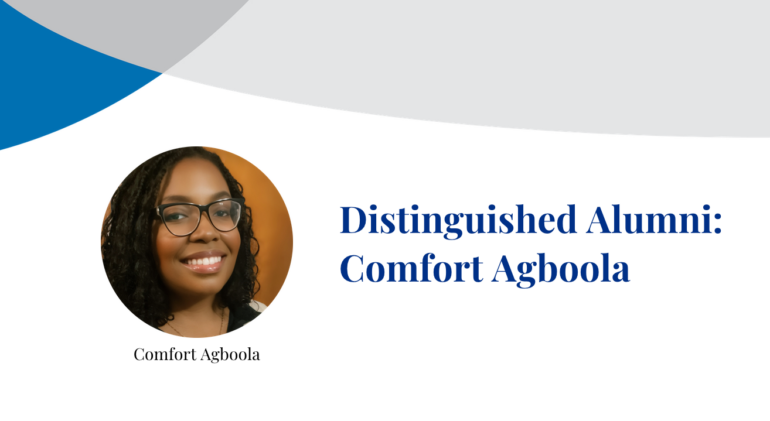When Comfort Agboola talks about writing, she doesn’t just mean putting words on a page. She sees it as a tool for empowerment, a way for students to claim their voices and tell their own stories. As a teacher in Chicago Public Schools, she watched students from diverse backgrounds, many new to the U.S., struggle to see themselves in traditional classroom materials.
That realization led her to The Chicago School, where she pursued a master’s degree in psychology to better understand how to create inclusive learning environments. In her master’s program, Agboola focused on culturally responsive teaching, a practice that shaped how she connected with her students and their families. Many of her students came from Latino and Polish communities, and during home visits, she used interviewing skills from her coursework to help parents feel heard. Doing so helped her “create a warm, welcoming environment for someone who is new to the country,” she says.
This level of understanding and care that Agboola has for students, informed by her time at The Chicago School, has earned her accolades and awards at the county, state, and national levels. But her impact extends beyond the school system.
Agboola’s time at The Chicago School also sparked an additional professional endeavor for her. Through her Lit and Love program, a writing enrichment and teacher coaching firm based in Chicago, she encourages students to find their voice and use writing as a creative outlet.
“Everyone has a story to tell,” Agboola says. “Especially in communities that are marginalized, it’s so important that we tell our own stories, not having someone speak for us.”
Lit and Love has helped students improve their Illinois Assessment of Readiness (IAR) writing scores. Anecdotally, Agboola says many students often start out saying they don’t like writing but later develop a passion for the craft.
Teachers she coaches also see that joy of writing in their students. “They’re seeing their students as storytellers,” Agboola says. “Getting that feedback from the teachers I’m coaching that it’s working in different environments across the city is really impactful.” She uses feedback to tweak the curriculum or better understand where to allocate resources.
Agboola’s thesis at The Chicago School was about using art as therapy, which included writing. A hip-hop writing practice, online student forums, and clinical hours during which she worked with students were all meaningful to her and laid the groundwork for Lit and Love. She learned more about writing as a therapeutic practice that also can foster collaboration as a community, which in turn drives her teaching and personal writing practices.
Agboola’s dedication to her students led to her winning a Milken Educator Award in 2024. “I’m still at a loss for words,” she says about the honor. “About a year later, I’m still amazed that it happened and am very happy for the opportunity. It helped elevate the things I’ve been talking about around writing and storytelling and giving me a platform to do so that is honoring to teachers, honoring to students, honoring to their families.”
Since then, she has been able to go to the National Council of Teachers of English conference to focus on writing and storytelling and has been able to go to other conferences to focus on writing, social-emotional learning (SEL), and restorative practices in school. Most recently, Agboola was named a Cook County Co-Regional Teacher of the Year and a finalist for the Illinois Teacher of the Year.
Agboola is now turning her focus to her own writing. She’s currently working on two books, one for her Lit and Love curriculum and another on teacher leadership and community. While she has long encouraged students to find their voices, she’s embracing a more reflective personal practice, drawing from her own experiences in the classroom as well as lessons learned during her time studying at The Chicago School.
Writing has become both a creative and restorative act. Agboola sets up her workspace with intention, using meditation and mental walks to ground herself in emotions, memories, and the people who have shaped her journey. It’s a spiritual process, one that not only fuels her work but also serves as an act of self-care.
“With a career like teaching or anything that you’re working with others, you give so much of yourself,” Agboola says. Now she has a space to focus on herself and continue to share knowledge that inspires students and teachers alike.

